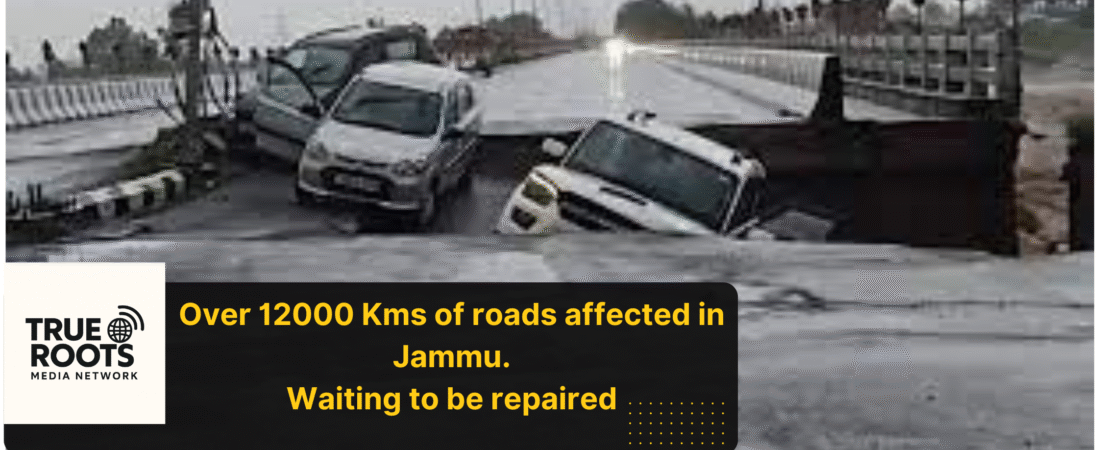By Ashok Sharma, Editorial Desk, True Roots Media JAMMU, September 16, 2025 –
In the shadowed valleys and rugged hills of rural Jammu, where the scars of August’s floods run deeper than the swollen rivers ever did, a new crisis festers: a transportation nightmare born of political indifference and administrative paralysis. Weeks after the torrential downpours and cloudbursts ravaged the region—claiming over 40 lives, displacing thousands, and turning villages into islands of isolation—the vital bridges that connect these remote hamlets to the world remain unrepaired. What was once a natural disaster has morphed into a man-made catastrophe, courtesy of a local administration more obsessed with political maneuvering than delivering on its promises. As trucks idle, ambulances detour perilously, and farmers watch their harvests rot, the silence from Srinagar and Delhi is deafening. This is not just neglect; it’s a betrayal of the very people who form the backbone of Jammu’s rural economy.

Picture this: In the remote tehsils of Reasi and Udhampur, where the Chenab and Tawi rivers carved paths of destruction, entire communities are marooned. The Tawi Bridge collapse near Jammu city on August 27 wasn’t an isolated tragedy; it was a harbinger. Bridges like the one near Logate Morh on the Jammu-Pathankot highway, washed away by overflowing Sahar Khad nallah, and the critically damaged Kijpora bridge in Ladakh’s fringes (with spillover effects in Jammu’s border areas), have severed supply lines. In rural Poonch and Rajouri, where over 1,000 houses were partially destroyed, villagers trek miles on foot or risk makeshift crossings on dangling ropes to reach the nearest market or hospital. “Our bridge over the nallah is gone; we carry the sick on stretchers across slippery rocks. Where are the engineers? Where is the government?” vents Rakesh Kumar, a farmer from a hamlet in Reasi, whose family lost livestock in the floods and now faces starvation as transport halts crop delivery.
The impacts ripple far beyond inconvenience—they’re life-threatening. In Doda’s hilly interiors, where flash floods swept away three bridges and damaged government buildings, essential medicines and food rations arrive sporadically, if at all. Ambulances from Kishtwar to Jammu take double the time, navigating potholed detours that were never meant for heavy vehicles. The Jammu Division’s rail traffic, suspended for days due to Bridge Number 17’s severe damage from flash floods, stranded thousands of passengers and canceled 40 trains, but rural bus services—lifelines for 68% of Jammu’s rural population—fare worse. Over 12,000 kilometers of roads were battered, yet repair crews are nowhere in sight in remote areas. Farmers in Akhnoor and Ranbir Singh Pura report 20% crop losses not just from waterlogging, but from inability to transport paddy and maize to mandis, leading to distress sales at rock-bottom prices. “Politicians came for photos after the floods; now, they’re gone. Our bridges are still down, and we’re forgotten,” laments Sunita Devi, a widow from a flood-hit village in Rajouri, whose daughter’s school commute now involves a dangerous river ford.
This isn’t an accident; it’s a pattern of political ignorance that prioritizes optics over action. The National Conference-Congress alliance, under Chief Minister Omar Abdullah, has been quick to announce grand relief packages—₹209 crore from the Centre, ₹28 crore from BJP-led initiatives—but delivery? A farce. While urban Jammu sees ministerial visits and superficial road patches, rural bridges languish due to stalled CAPEX funds; the Jammu Municipal Corporation awaits ₹26 crore, a pittance compared to Srinagar’s swift ₹46 crore release. Deputy Chief Minister Surinder Kumar Choudhary’s pleas for a ₹1.60 lakh crore package double the 2014 floods’ aid fall on deaf ears, but even the promised ₹209 crore seems siphoned toward visible projects. The land mafia, thriving on encroached floodplains, faces no reckoning—CPI(M)’s M.Y. Tarigami’s September 6 demand for probes goes unheeded, allowing illegal constructions to exacerbate future risks.

Worse, political distractions eclipse relief. In Doda, the PSA detention of AAP MLA Mehraj Malik has sparked protests and detentions, diverting resources from bridge repairs to crowd control. Officials like Harvinder Singh focus on “public order” over infrastructure, while the BJP’s Girdhari Lal Raina accuses NC of “brazen discrimination” without offering solutions. The inter-ministerial central team, post-Home Minister Amit Shah’s visit, assessed damages but left rural Jammu with empty assurances. Torrential rains on August 25 damaged the Jammu-Pathankot bridge, yet no timeline for reconstruction.

In Udhampur, where landslides blocked highways and wrecked bridges, restoration is “temporary,” per locals, risking collapse in the next downpour. The Vaishno Devi yatra’s halt, with 30 dead from landslides, underscores the peril, but rural pilgrims from Poonch trek even farther without safe crossings.
Health and education suffer too. Stagnant waters breed diseases—diarrhea outbreaks in rural Reasi treated thousands informally—while unrepaired bridges delay medical access. Schools in remote Rajouri, damaged in the floods, remain closed longer, widening the literacy gap in areas already at 60%. Women and children bear the brunt, fetching water across treacherous paths or missing classes altogether. The floods were the wettest day in 115 years for Jammu, yet preparedness was zilch—no early warnings, no reinforced bridges despite repeated pleas.
True Roots Media’s #RuralJammuBridgesBroken campaign calls this out: Political ignorance isn’t benign; it’s criminal. We demand immediate bridge audits, dedicated rural repair teams, and transparent fund tracking. Tag #RuralJammuBridgesBroken, share videos of stranded villages, and flood officials’ inboxes. Chief Minister Abdullah, Lieutenant Governor Sinha—rural Jammu isn’t your footnote; it’s your duty. The floods may have receded, but the administration’s neglect floods on. It’s time to bridge the gap between promises and reality—before another disaster strikes the forgotten.
Document unrepaired bridges and transport woes in rural Jammu—share photos, stories, or videos at info@truerootsmedia.com. We’ll amplify them to reach administrators, media, and activists for real change.

